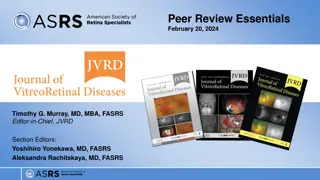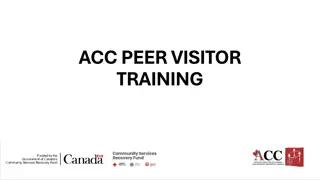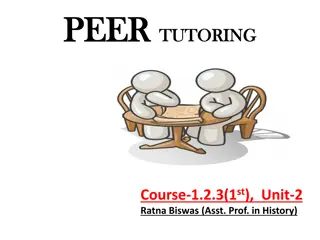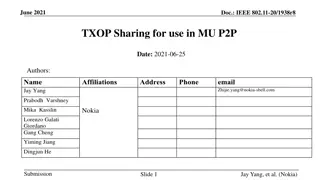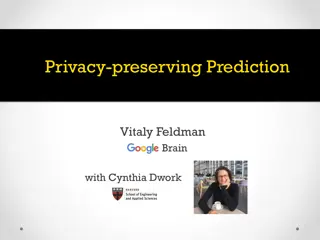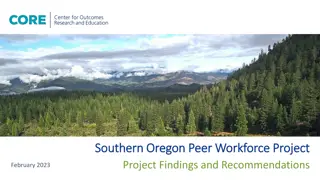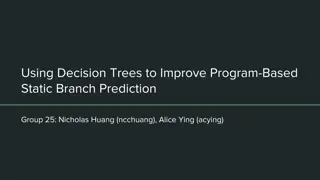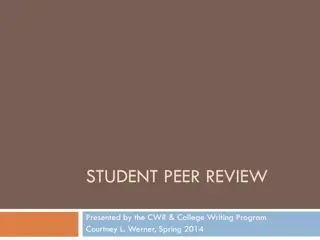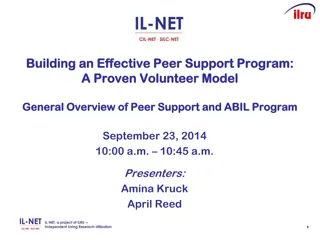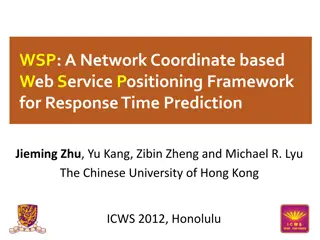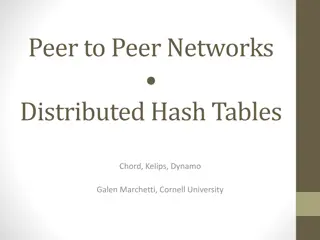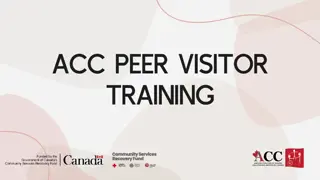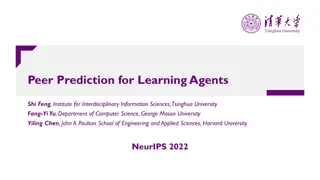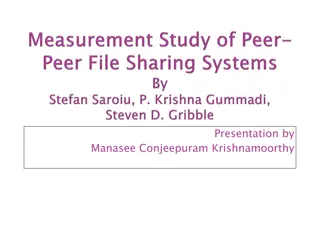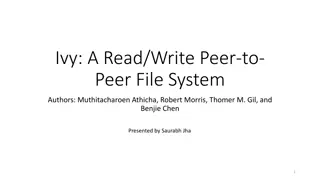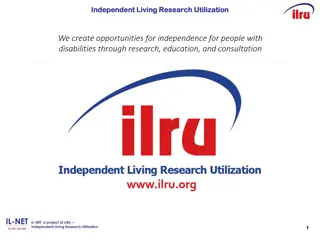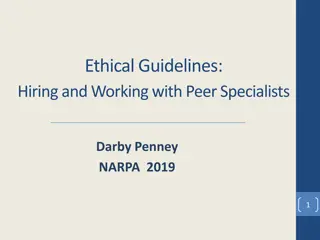Address Prediction and Recovery in EECS 470 Lecture Winter 2024
Explore the concepts of address prediction, recovery, and interrupt recovery in EECS 470 lecture featuring slides developed by prominent professors. Topics include branch predictors, limitations of Tomasulo's Algorithm, various prediction schemes, branch history tables, and more. Dive into bimodal,
0 views • 42 slides
Peer Support Across the Lifespan: A Comprehensive Guide
Exploring the impact of peer support at various stages of life, this comprehensive guide delves into the evolving role of advocates, the types of peer support available, and the significance of youth involvement. From adolescence to older adulthood, peer support remains flexible, transformative, and
1 views • 21 slides
Insights into Financial Services, Banking, and Stocks Innovations
Explore the latest trends in financial services including contactless payments, mobile banking, security systems, peer-to-peer lending, and the impact of Bitcoin in the industry. Discover how technology is transforming the way we manage finances and investments. From convenient mobile banking soluti
0 views • 18 slides
Enhancing Language Learning Through Peer Assessment
Explore the benefits of peer assessment as a valuable tool for language learning, comparing it with self-assessment. Discover the components and challenges of self-assessment, along with the potential of peer assessment to improve accuracy and promote self-regulation. Gain insights into what peer as
4 views • 29 slides
H.264/AVC: Key Concepts and Features
Exploring the fundamentals of MPEG-4 Part 10, also known as H.264/AVC, this overview delves into the codec flow, macroblocks, slices, profiles, reference picture management, inter prediction techniques, motion vector compensation, and intra prediction methods used in this advanced video compression
4 views • 32 slides
Peer Review Essentials
Explore the importance of peer review in research, the benefits of being a reviewer, types of peer review processes, and basic principles to follow as a peer reviewer. Learn how to make initial impressions when reviewing papers effectively.
1 views • 37 slides
Peer Support and Visitor Training for Amputees
Explore the world of peer support and visitor training for individuals who have undergone amputations. Understand the benefits of peer support, the role of peer visitors, and engage in group discussions to enhance knowledge and skills in providing meaningful support. Dive into role-playing activitie
0 views • 90 slides
Mental Health and Peer Support Services Event
Join Specialty Mental Health Services (SMHS) and Peer Support Services on Tuesday, April 19, 2022, from 3:00 p.m. to 4:00 p.m. for valuable insights and strategies. Discover the importance of DHCS programs in ensuring coverage continuity for millions of beneficiaries. Learn how to become a DHCS Cove
2 views • 23 slides
Importance of Boundaries for Peer Specialists
Boundaries are essential in defining acceptable behavior and maintaining safety and trust in relationships, including peer relationships. Peer specialists should establish and communicate their boundaries effectively while respecting those of others. Tips for setting boundaries are provided, emphasi
2 views • 14 slides
Peer Tutoring: Definition, Types, and Objectives
Peer tutoring is a collaborative learning approach where students of similar or different ages help each other learn. It involves one student instructing another in a subject where the former is knowledgeable and the latter is not. The primary objectives of peer tutoring include enhancing students'
1 views • 12 slides
Enhancing Peer Observation for Professional Development
Explore the purposes and challenges of peer observation, learn strategies to implement effective peer feedback, bridge institutional requirements with developmental goals, and foster a culture of collaboration in teaching practices. Discover a framework for constructive dialogue, evaluate learning e
3 views • 12 slides
IEEE 802.11-20/1938r8 TXOP Sharing for MU P2P Communication
The document discusses the IEEE 802.11-20/1938r8 standard and proposes mechanisms for an Access Point (AP) to facilitate peer-to-peer communication between stations (STAs). It introduces the concept of triggered TXOP sharing to enhance latency performance and spectral efficiency in scenarios involvi
8 views • 8 slides
Insights from Surveys on Peer Review & Peer Feedback in Scholarly Communication
Results from surveys on peer review and peer feedback provide valuable insights into the demographics, general attitudes, and major challenges faced in scholarly communication. The data reveals respondent demographics, overall satisfaction with peer review systems, and prevalent problems in current
0 views • 13 slides
Privacy-Preserving Prediction and Learning in Machine Learning Research
Explore the concepts of privacy-preserving prediction and learning in machine learning research, including differential privacy, trade-offs, prediction APIs, membership inference attacks, label aggregation, classification via aggregation, and prediction stability. The content delves into the challen
2 views • 11 slides
Enhancing Supportive and Accessible User Experiences Through Single Sign-Ons and Peer Feedback
Empower your users with mobile-supportive single sign-ons, inclusive environments, and seamless peer-to-peer feedback. Ensure accessibility at all times, monitor skill development, and create positive user experiences. Utilize instant feedback mechanisms, track progress, and implement seamless seque
0 views • 9 slides
Distributed Hash Tables in Peer-to-Peer Systems
Distributed Hash Tables (DHTs) are a fundamental component in organizing nodes in peer-to-peer networks. By using hash functions to assign keys to peers, DHTs enable efficient storage and retrieval of objects. Peers in a DHT are responsible for storing and managing key-value pairs, with each key bei
1 views • 31 slides
Southern Oregon Peer Workforce Project Findings and Recommendations
The Southern Oregon Peer Workforce Project conducted research to enhance peer training and supervision programs. The project aimed to foster shared learning among peer support services in Southern Oregon, leading to improved advocacy and evaluation capabilities. The findings and recommendations from
0 views • 42 slides
Theoretical Justification of Popular Link Prediction Heuristics
This content discusses the theoretical justification of popular link prediction heuristics such as predicting connections between nodes based on common neighbors, shortest paths, and weights assigned to low-degree common neighbors. It also explores link prediction generative models and previous empi
0 views • 39 slides
Using Decision Trees for Program-Based Static Branch Prediction
This presentation discusses the use of decision trees to enhance program-based static branch prediction, focusing on improving the Ball and Larus heuristics. It covers the importance of static branch prediction, motivation behind the research, goals of the study, and background on Ball and Larus heu
0 views • 36 slides
Peer Learning Benefits and Practical Applications in Librarianship
Exploring the benefits of peer-to-peer learning in librarianship through real-life scenarios and research projects. Peer training enhances understanding, encourages questions, and provides a supportive environment for skill development. The MLA research project exemplifies collaborative learning wit
0 views • 21 slides
Professional Peer Supervision: Enhancing Support and Development for the Peer Workforce
Chris Grumley, a Specialist Peer Worker at Flourish Australia, presents the importance of Professional Peer Supervision in supporting and developing the Peer Workforce. The benefits include critical reflection, accountability, and nurturing expertise. The focus is on utilizing Lived Experience, well
0 views • 14 slides
Global Peer Review Activities and Future Plans Overview
This document highlights the recent peer review activities conducted by the Subcommittee on Peer Review, focusing on the accomplishments and upcoming plans for enhancing peer review processes. It includes insights from the Global Flyer Survey, training programs, and the development of guidelines, al
0 views • 3 slides
Creating a Purposeful Peer Job: Essential Tips and Strategies
Gain insights into creating a meaningful peer job through understanding the role, job responsibilities, and effective hiring practices. Explore the difference between peer role and peer job, along with valuable tips for a successful hire in peer support positions. Enhance your knowledge to develop a
0 views • 21 slides
Enhancing Peer Review Practices in College Writing Programs
Explore the significance of peer review in college writing instruction, emphasizing the practicality, foundational pedagogies from the 1970s-1990s, and strategies to improve peer review processes. Learn how to set a foundation, make peer reviews more social using writing groups and online platforms,
0 views • 5 slides
Peer Support in Independent Living: Importance, Types, Training, and COVID Impact
Peer support in independent living plays a crucial role in connecting individuals with disabilities, providing a way for them to connect, share experiences, and build a supportive community. It is considered a core service that can be offered through individual or group settings. Training programs a
0 views • 9 slides
Building an Effective Peer Support Program: Overview and Regulations
The presentation provides insights into building an effective peer support program, encompassing the definition of peer support, regulations governing peer support, and the role of volunteer peer mentors. It emphasizes the importance of peer relationships and role models in promoting independence am
0 views • 24 slides
Network Coordinate-based Web Service Positioning Framework for Response Time Prediction
This paper presents the WSP framework, a network coordinate-based approach for predicting response times in web services. It explores the motivation behind web service composition, quality-of-service evaluation, and the challenges of QoS prediction. The WSP framework enables the selection of web ser
0 views • 30 slides
Evolution of Peer-to-Peer Networks and Distributed Hash Tables
Peer-to-peer networks and distributed hash tables have evolved significantly over the years, from the early days of ARPANET to the emergence of decentralized systems like Chord, Kelips, and Dynamo. This evolution has brought about a shift towards greater decentralization, improved scalability, and e
0 views • 39 slides
Peer Support and Visitor Training Workshop
Explore the importance of peer support in the amputation process through engaging discussions and role-playing activities. Discover the short-term and long-term benefits of peer support, understand the attributes and benefits it offers, and delve into when and where peer visiting can be most impactf
0 views • 93 slides
Peer Prediction Mechanisms in Learning Agents
Peer prediction mechanisms play a crucial role in soliciting high-quality information from human agents. This study explores the importance of peer prediction, the mechanisms involved in incentivizing truthful reporting, and the convergence of learning agents to truthful strategies. The Correlated A
0 views • 7 slides
Uncovering Fabricated Data in Stem Cell Research: The Haruko Obokata Scandal
Haruko Obokata, a promising stem cell researcher in Japan, faced allegations of data fabrication, leading to a significant research scandal. Post-publication peer review platforms like PubPeer, PubMed Commons, F1000 Research, and ResearchGate Open Review play vital roles in detecting and addressing
0 views • 11 slides
Amendments to WIPPS Manual for Climate Prediction at INFCOM-3, April 2024
The document discusses amendments to the Manual on WIPPS for climate prediction, including new recommendations for weather, climate, water, and environmental prediction activities. It introduces concepts such as Global Climate Reanalysis and the coordination of multi-model ensembles for sub-seasonal
1 views • 10 slides
Local MAC Address Assignment Protocol (LAAP) and 802.1CQ
The Local MAC Address Assignment Protocol (LAAP) in conjunction with 802.1CQ specifies protocols and procedures for locally unique assignment of MAC addresses in IEEE 802 networks. LAAP operates in two modes - Server Mode and Peer-to-Peer Mode, ensuring efficient allocation of MAC addresses while av
0 views • 15 slides
Evaluating Peer-Peer Systems in Distributed Architectures
Abundant research is being conducted in peer-peer architectures, focusing on evaluating peers to understand system effectiveness. The lack of such assessments led to a detailed study on organizing peers in decentralized systems like Napster and Gnutella. The process involved crawling systems to meas
0 views • 43 slides
Blockchain and Bitcoin Price Forecasting
This text provides valuable insights into blockchain technology, Bitcoin history, core concepts of blockchain, Bitcoin network structure, inherent problems in Bitcoin, and the model for Bitcoin price prediction using graph chainlets. It covers essential aspects such as the distributed ledger, chain
0 views • 29 slides
Analysis and Comparison of Wave Equation Prediction for Propagating Waves
Initial analysis and comparison of the wave equation and asymptotic prediction of a receiver experiment at depth for one-way propagating waves. The study examines the amplitude and information derived from a wave equation migration algorithm and its asymptotic form. The focus is on the prediction of
0 views • 23 slides
Preventing Peer-to-Peer Sexual Abuse in Organizations
Learn how to identify, prevent, and respond to peer-to-peer sexual abuse within your organization. Understand what peer abuse entails, recognize warning signs, and address power imbalances that may lead to such incidents. The content highlights the reality of peer-to-peer abuse, debunks common misco
3 views • 23 slides
Ivy: A Read/Write Peer-to-Peer File System Overview
Introduction to Ivy, a read/write peer-to-peer file system designed to enable easy storage and access of remote files in a distributed manner. The presentation covers the motivation for peer-to-peer distributed file systems, challenges in designing such systems, and how Ivy addresses trust issues an
0 views • 17 slides
Peer Mentor Program in Independent Living Research
Integrating CIL Core Services for a Holistic Consumer Experience includes implementing or strengthening effective core services in peer support through examples like Ability360's program. The definition of a volunteer peer mentor program is explained, highlighting its importance in providing role mo
0 views • 44 slides
Ethical Guidelines for Peer Specialists
Understanding the essence of peer support, the ethical guidelines for hiring and working with peer specialists, and the evolution of peer staff models over the years. Exploring the definitions and responsibilities of peer support within mental health and substance use recovery. Revealing insights fr
0 views • 14 slides





